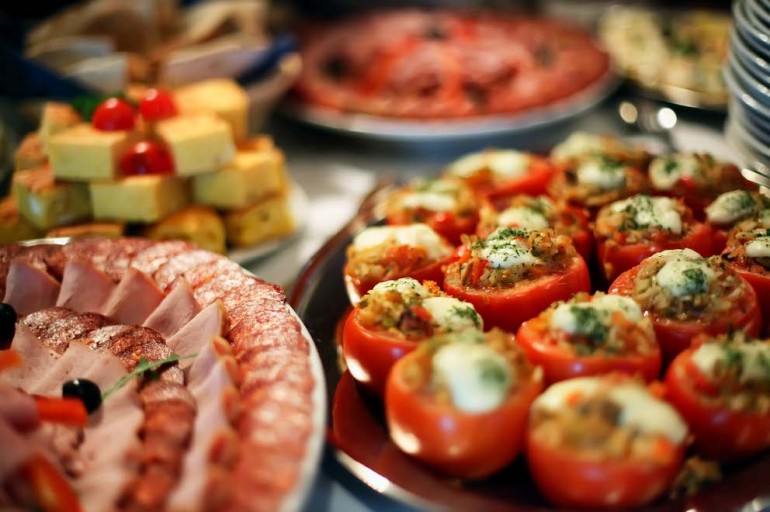
Rachel Stevens, PsyD, Clinical Director of Carolina House Eating Disorder Treatment Facility
 The holidays are past but your waistline might still be showing evidence of it with a few extra pounds around your middle, butt or thighs. Nearly everyone ramps up the intake of calories during the holiday season. But for those with eating disorders, the time surrounding the holidays can feel like a culinary mind field. Large meals, family and friends expecting you to partake, and the ever-present allure of smell and visual input make it nearly impossible for anyone to say no all day long. It takes a lot of energy to keep walking away from temptation.
The holidays are past but your waistline might still be showing evidence of it with a few extra pounds around your middle, butt or thighs. Nearly everyone ramps up the intake of calories during the holiday season. But for those with eating disorders, the time surrounding the holidays can feel like a culinary mind field. Large meals, family and friends expecting you to partake, and the ever-present allure of smell and visual input make it nearly impossible for anyone to say no all day long. It takes a lot of energy to keep walking away from temptation.
For people with eating disorders, the challenge is even greater. In her book, Surviving the Holidays with Your Recovery Intact, Rachel Stevens, PsyD offers a four-point framework to help you navigate the pre and post-season food tsunami. It’s practical advice that will also serve you well the rest of year.
1. Have a plan
When you know you’re going to an event, unstress by gathering some “event intelligence” ahead of time in order to create a personalized game plan. These questions will help:
- Where is the event?
- Is there a place inside (or outside) that you can use to take 5 minutes of alone time to regroup?
- How many people? Do you know anyone – or are these all “friends you haven’t met yet?”
- What is the menu going to look like? Will it be a plated meal or a buffet or family-style self-serve event?
- Are you going to be comfortable at this event?
- Do they have armless chairs if you need those?
Once you have the plan, review it and practice it frequently
Once you have the information you need, you can plan according to your preferences, needs, and desires. Involve trusted individuals – therapist, dietitian, family, friends – in your planning, and perhaps even role play some possible events so you can have a script ready to deal with awkward or uncomfortable moments.
Once you have the plan, review it and practice it frequently. By the time you get to the triggering events, your plan will feel like second nature.
2. Have a buddy
Having someone you know and trust at any food-laden event can be incredibly helpful. Even if they never say a word about food or symptoms, it can still be a relief to look at a person and know that they have your (and your recovery’s!) back.
Review your plan with your support system ahead of time. Work out some signals with him or her for times that you may be feeling overwhelmed. Make sure he or she knows what things would be helpful to say, and what may be harmful. For instance, even if the intent is positive, commenting on the amount of food you’re eating or not eating can be very painful.
Make sure your buddy is aware of people and things that may be your personal danger zones. For instance:
- Does Great Aunt Martha always make a comment about your weight or appearance?
- Is the menu filled with your personal trigger foods?
- Is this holiday or event always rife with conflict in your family?
Give your support buddy the low-down on what to expect and how to help you – and go in feeling more supported than ever!
Having someone you know and trust at any food-laden event can be incredibly helpful
3. Have an exit strategy
Part of what you’ll need and want to focus on in your plan (and with your buddy!) is an exit strategy. If things get to be too much, and you are getting into your “danger zone,” it may be time to find a way to gracefully bow out of the environment. Discuss with your buddy ahead of time a creative exit strategy. And then, if things are too much, and your coping strategies aren’t working, you can still leave with your recovery intact – and have a much better chance of also preserving the integrity of your relationships!
 4. Mindfulness and meaning
4. Mindfulness and meaning
Two of the things that can be most helpful when approaching an event are to remember what I will now dub “The Two ‘M’s:”
- Be Mindful: Mindfulness is a practice we teach at Carolina House, and is a core tenet for Dialectical Behavior Therapy. It is a skill that allows you to truly engage with the present moment; not yesterday, not tomorrow, just right now. So often when approaching a challenging situation, our minds turn to failures of the past, or turn to worries for the future. When you can take a breath and focus on just the one moment you are currently in, things tend to become much easier.
- Find Meaning: Meaning is just as important. Despite appearances, the holiday season or other events are not actually about the food. Whatever one’s spiritual or secular beliefs, traditions, and practices may be, chances are there is a tremendous amount of meaning behind them. In Jewish faith, for instance, each food is chosen for a specific, symbolic purpose. In Christian tradition, the holidays may all involve a gathering around food, but their actual meaning is steeped in history, faith, values, and spiritual purpose. If you can allow yourself to focus on the reason for the celebration, it can allow the food to be either spiritual or physical fuel and not one land mine after another.





